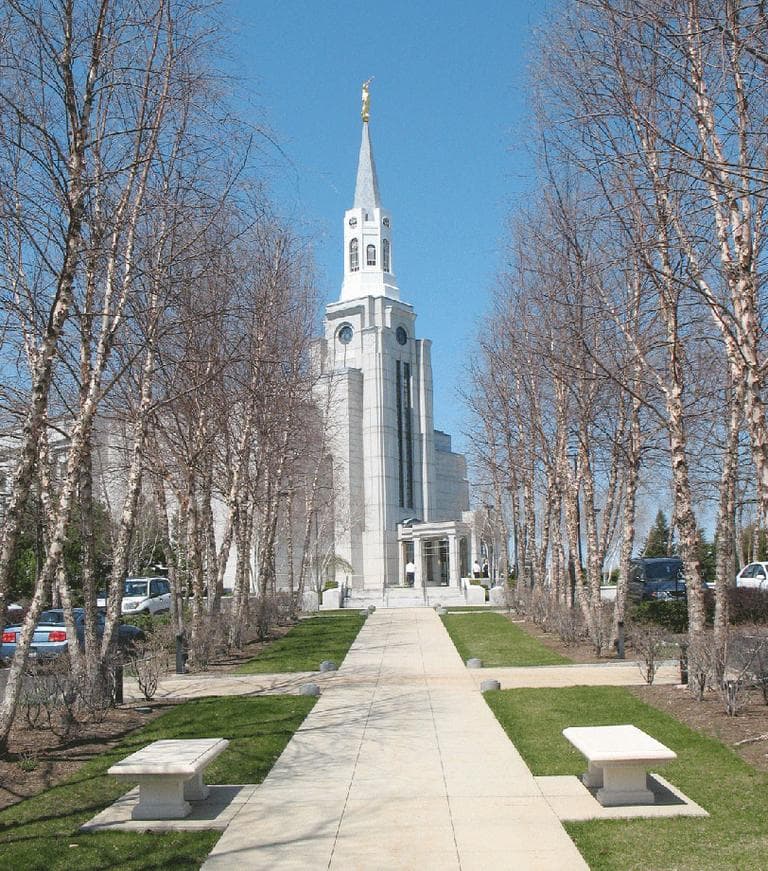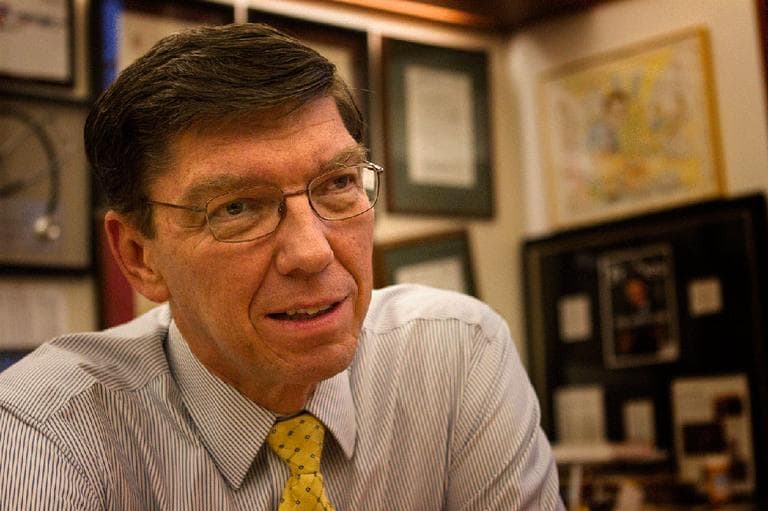Advertisement
At Belmont Temple, Romney Was An Influential Leader
ResumeThe third entry of a six-part series

BOSTON — A poll by the Pew Research Center says Mitt Romney’s religion will likely cost him support in the Republican primary because many white evangelical Protestants don’t view the Mormon religion as a Christian faith.
Romney was an influential church leader in the Church of Jesus Christ of Latter-day Saints in Boston for more than a decade. In this report, we look at how his church leadership shaped him.
Church Growth Under Bishop Romney
Romney no longer regularly attends Sunday church services at the Belmont Meeting House*, but his presence is still felt. One reminder is the beautiful pipe organ, which his large donation helped buy.
Romney currently doesn’t hold any leadership positions in the church as he runs for president. But he’s believed to be a Mormon in good standing, which means he gives 10 percent of his pretax income to the church — millions of dollars over the years. He also doesn’t drink or smoke and thus probably has a "temple recommend" card in his wallet. The card has a bar code that allows him entry to any Mormon temple. Even though faith and the Church of Jesus Christ of Latter-day Saints Church play a fundamental role in his life, Romney rarely mentions it.
"My religion is for me and how I live my life," Romney told an Iowa radio host recently.
For 15 years, Romney was in charge of the spiritual and sometimes practical needs of thousands of Mormons in the Boston area. Church members say he led with patience, built teams to solve problems, and showed deep compassion — characteristics that would make a good president.
"You do get a sense that this man is largely a gentle soul, that’s he’s decent, he’s never rude," said Robert Draper, a New York Times reporter following Romney on the campaign trail. "But what you don’t get a sense is of his ability to be compassionate on this one-on-one basis."
Romney oversaw the LDS church in Boston at a time of great growth and challenges. Soon after he became bishop in 1981 at the age of 34, the new meeting house in Belmont mysteriously burned down.
[sidebar]
WBUR traces our state's long connection to the GOP presidential candidate. A six-part series:
- 11/22: Romney's Harvard Years: An Earnest Traditionalist
- 11/30: Romney's Bain Years: Turnaround Specialist-In-Chief
- 12/6: At Belmont Temple, Romney Was An Influential Leader
- 12/15: Romney's Jobs Record As Governor Is Up For Debate
- 12/20: Analyzing Romney's Leadership On Health Care
- 12/27: Romney As Executive: Big Dig Crisis Management
Timeline: Mitt Romney's life and career
Related: WBUR's complete Election 2012 coverage
[/sidebar]
"The building was almost completed," said Grant Bennett, a Mormon who served as bishop after Romney, when it "caught fire late one night and burned from the front of the chapel down towards the back the of the building." Almost the entire building was destroyed.
The fire department said the fire was of suspicious origins, but it was never declared arson. But Mormons in the area say there was an undercurrent of religious bigotry. There was also an outpouring of support from many congregations who called Romney and invited him to hold services in their buildings. Romney saw this as an opportunity to build bridges, Bennett says, and took up the offers.
"We actually met in the Catholic St. Josephs Church for a couple of months, we met in the Armenian church for a couple of months, and we met in the Plymouth Congregational Church for a couple of months," he said.
Still Romney played a key role in coping with anti-Mormon sentiment when it bubbled to the surface again about 10 years later after the church announced plans to build a large temple at the top of Belmont Hill.
Scott Ferson, who is not a Mormon but lives in Belmont, volunteered to help the church with public relations during the controversy over the temple. He says the temple shows how well-respected Romney is in the church.
"To have it selected for this Belmont site," Ferson said, "really right on Mitt Romney’s backyard leads one to believe that he was instrumental in its location."
The fight between the LDS church and some town members over the size and height of the steeple continued for years in zoning board meetings and in court. Romney was involved behind the scenes, says Clayton Christensen, a fellow Mormon and a professor at Harvard Business School.
"I remember at a meeting Mitt saying, 'You know, I could be a force for good or I might be a lightning rod.' So he gave us good advice but then he kinda stepped aside and let others take the heat," Christensen chuckled.

Behind closed doors, Romney was very diplomatic, Ferson says.
"He knew that they were going to be able to achieve what they were if they were more accommodating," Ferson remembered. "He was very patient. I think that’s probably a good skill for Middle East peace, being patient."
Patience won out. The temple was built with one spire topped by a gold Moroni angel. It’s sometimes called “Mitt’s Temple” by people in Belmont.
Romney's Spiritual Counsel
To understand Romney is to understand the tenets of the Mormon Church, which he clearly demonstrates in his character. Service and teamwork are two central themes. As bishop, he organized the all-volunteer network of the church and was elevated to what’s called stake president, giving him oversight of about a dozen congregations. It’s too much work for one person who also has a job and family. So Ron Scott, a journalist, distant cousin and biographer of Romney, says Romney always had a strong team.
"It’s almost a spiritual representation of what you learn in business school: the more you can involve the team, the more you can engage the team, the better the team functions," Scott said. "You get that fairly early in Mormonism. It’s really Mormonism 101."
The bishop doesn’t give sermons during church services; they’re given by members. But they are a spiritual beacon of sorts, counseling church members on problems with employment, drug addiction and relationships. And as bishop, Romney seemed to sense when someone needed a boost, Christensen says. He remembers one night when he and his wife were feeling overwhelmed by their church duties, three kids under the age of 5 and a new house and job. He heard a knock at the door.
"And Mitt Romney knocks on the door and said, 'Can I come in?' He said, 'I was driving home and I just had a feeling that God has a message for you. And he can’t get to you directly 'cause you’re too tired, but the message is that God loves you. And that he’s happy with what you are doing for other people.' "
Christensen tears up again at the memory. Many other Mormons tell similar stories of how Romney helped them.
But there are a few detractors. Scott, who wrote an independent biography, says a woman in Romney’s congregation told him Romney tried to persuade her not to have an abortion, even though she had a life-threatening condition. Her doctor and the Mormon stake president, a church position above Bishop Romney, had already advised her to get an abortion.
"Into the picture walked Mitt and he took a fairly aggressive stance: carry the baby to term," Scott said. "People have seen that as being a sign of a fairly heartless, imperious kind of guy, or was he simply just being overly zealous in the way he was trying to lead and to provide moral counsel to someone in his charge, counsel that was consistent with what he perceived to be the teachings of his church?"
Romney’s counseling provides a window into his complicated stance on abortion. As a Mormon it shows he’s opposed to it. But when he was governor he supported a woman’s right to choose. Now as a Republican presidential candidate he is squarely anti-abortion.
As leader of the LDS church in Belmont, Romney’s compassion, patience and teamwork were focused primarily on other Mormons. That might explain why church members know a different side of him than he's shown on the campaign trail, where he’s frequently seen as smug and distant. Christensen says maybe that’s because people perceive Romney as being born with a silver spoon in his mouth.
"I think that people look at how handsome he is, how articulate he is, and you say, he hasn’t experienced life, and oh my gosh, I think he has experienced a more difficult side of life," he said.
The difficult side he saw as a counselor to troubled church members. Romney’s challenge will be tapping into what he learned as a Mormon leader, without drawing too much attention to his religion.
Correction: Due to an editing error, an earlier Web version of this story identified that Sunday services take place at the Boston Massachusetts Temple. It is the Belmont Meeting House.
This article was originally published on December 06, 2011.